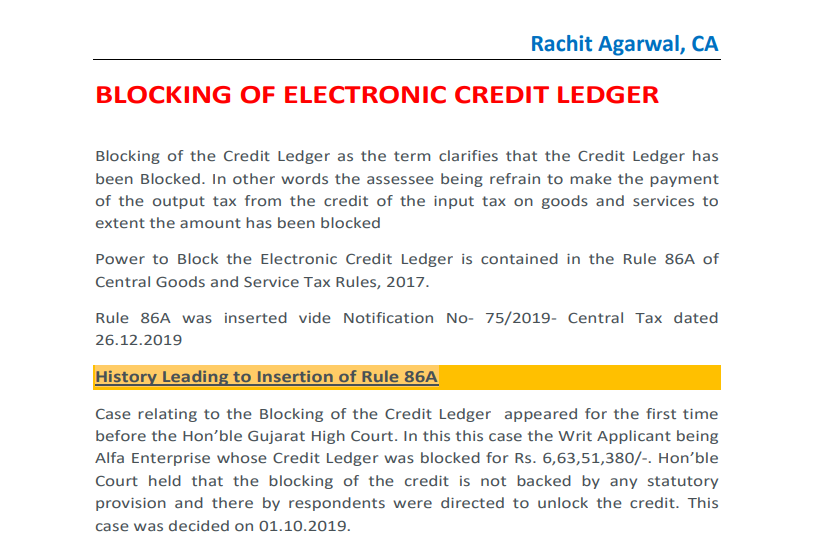Blocking of Electronic Credit Ledger
Table of Contents
- Blocking of Electronic Credit Ledger
- History Leading to Insertion of Rule 86A
- The intent of Insertion of Rule 86A of CGST Rules 2017
- Legislative Competence of Rule 86A
- Rule 86A is Pari-Material to Rule 8(3A) of Central Excise Rules, 2002
- Authorization to Block the Electronic Credit Ledger
- Reasons to Believe for Blocking the Electronic Credit Ledger
- Scope of Fraudulent Credit and Ineligible Credit for Blocking Credit Ledger
- Blocking of Credit Ledger Serious Impact the Working of Business
- Issue of Show Cause Notice before Blocking the Credit Ledger
- Unblocking of the Credit Ledger
- Automatic Release of the Blocked Credit of Input Tax
- Read the copy:
Blocking of Electronic Credit Ledger
Blocking of the Credit Ledger as the term clarifies that the Credit Ledger has been Blocked. In other words, the assessee being refrain to make the payment of the output tax from the credit of the input tax on goods and services to extend the amount has been blocked
Power to Block the Electronic Credit Ledger is contained in the Rule 86A of Central Goods and Service Tax Rules, 2017.
Rule 86A was inserted vide Notification No- 75/2019- Central Tax dated 26.12.2019
History Leading to Insertion of Rule 86A
The case relating to the Blocking of the Credit Ledger appeared for the first time before the Hon’ble Gujarat High Court. In this case, the Writ Applicant being Alfa Enterprise whose Credit Ledger was blocked for Rs. 6,63,51,380/-. Hon’ble Court held that the blocking of the credit is not backed by any statutory provision and thereby respondents were directed to unlock the credit. This case was decided on 01.10.2019.
Soon after the decision of the Hon’ble High Court, the CGST Rules were amended by way of Insertion of Rule 86A which empowers the Proper Officer to block the credit ledger.
The intent of Insertion of Rule 86A of CGST Rules 2017
Countrywide there was a huge issue of Invoice without the actual supply of goods leading the recipient the benefit of the credit of the input tax. Hence with the objective to block such credit availed by the fraudulent means the provision was inserted so that the person availing such credit can be debarred from availing the credit by the way of Blocking of Electronic Credit Ledger.
Legislative Competence of Rule 86A
Rule 86A of the CGST Rules, 2017 has been inserted by the exercise of the Power conferred u/s 164 of Central Goods and Service Tax Act, 2017 with the Central Government.
As per Clause 164 of Central Goods and Service Tax Bills, 2017 power has been granted with the Central Government for carrying out the provisions of the Act. In this case, there are no enabling provisions in the CGST Act, 2017 which allows for blocking the Electronic Credit Ledger. In our view, Legislative Competence of the Notification inserting Rule 86A will be challenged before Hon’ble High Court.
Rule 86A is Pari-Material to Rule 8(3A) of Central Excise Rules, 2002
Rule 8(3A) of Central Excise Rules, 2002 stipulates that if an assessee defaults in payment of duty beyond thirty days from the due date, the assessee shall not eligible to utilize cenvat credit for payment of duty and have to pay the duty consignment wise.
However, Rule 86A prescribes the situations where the Credit Ledger can be blocked.
Authorization to Block the Electronic Credit Ledger
Rule 86A(1) “The Commissioner or an officer authorized by him in this behalf, not below the rank of an Assistant Commissioner, having reasons to believe that credit of input tax available in the electronic credit ledger has been fraudulently availed or is ineligible in as much as……………”
In view of the above provision, the Electronic Credit Ledger can be blocked by
1. Commissioner
2. Assistant Commissioner with the authorization of Commissioner
Further Commissioner cannot delegate the power to block the credit ledger to an officer below the rank of Assistant Commissioner.
Further Assistant Commissioner can also not sub-delegate the power to his subordinate officer to block the credit Ledger
Reasons to Believe for Blocking the Electronic Credit Ledger
The Commissioner or Assistant Commission authorized by him before making an order for Blocking the Credit Ledger must have reasons to believe that the registered person has availed the credit of input tax fraudulently or have availed the ineligible credit.
Merely there is a difference in GSTR 2A and GSTR 3B cannot be the reason to believe for Blocking the Electronic Credit Ledger.
Further, merely the supplier has availed the credit fraudulent cannot be the reason to believe that the recipient of the goods or services has also indulged in the fraudulent activity of availing the credit of the input tax. Adjudication proceedings to be initiated against the supplier and not the recipient. Blocking of the Credit Ledger should be limited to the supplier only unless the recipient has fraudulently involved himself in availing the credit of the input tax.
Scope of Fraudulent Credit and Ineligible Credit for Blocking Credit Ledger
Electronic Credit Ledger can be blocked on the occurrence of any one of event
1. The credit of the Input Tax has been availed on the Invoice of the Registered Person found non-existent
2. The credit of the Input Tax has been availed without the receipt of the goods
3. The credit of the Input Tax has been availed by the Registered Person who is found non-existent
4. The credit of the Input Tax has been availed without in possession of the invoice
5. The credit of the Input Tax has been availed for which the tax has not been paid
Blocking of Credit Ledger Serious Impact the Working of Business
Blocking of the Credit Ledger is a very harsh provision and the same has to be applied in our opinion very cautiously. Blocking of the Credit Ledger results in the payment of tax by Electronic Cash Ledger. Hence the assessee is required to bring the additional Working Capital for the payment of tax. In this modern competitive world, the credit ledger is blocked it may have impacted the Right to Carry Business. There could be a violation of Article 19(1)(g) of the Constitution of India.
Issue of Show Cause Notice before Blocking the Credit Ledger
Rule 86A of the CGST Rules, 2017 does not mandate for the issue of Show Cause Notice before Blocking the Electronic Credit Ledger. However, the blocking of the credit ledger without giving the opportunity of being heard in violation of Natural Justice.
Supreme Court in case of East India Commercial Co. Ltd, Calcutta vs Collector of Customs, Calcutta [1983 (13) E.L.T. 1342 (S.C.)] Natural justice is violated if proceedings are initiated without show-cause notice. Whether the statute provides for notice or not, it is incumbent upon the quasi-judicial authority to issue a notice to the concerned persons disclosing the circumstances under which proceedings are sought to be initiated against them, otherwise, principles of natural justice are necessarily violated. [para 27]
Unblocking of the Credit Ledger
Rule 86A(2)of CGST Rules, 2017
The Commissioner or the officer authorized by him under sub-rule (1) may, upon being satisfied that conditions for disallowing debit of electronic credit ledger as above, no longer exist, allow such debit.
In view of the above condition for disallowing the debit of credit ledger may be removed upon the satisfaction of the Commissioner. If Commissioner is satisfied with the pleadings of the assessee he may issue such order
Automatic Release of the Blocked Credit of Input Tax
Rule 86A(3)-Such restriction shall cease to have effect after the expiry of a period of one year from the date of imposing such restriction.]
Restrictions that have been imposed for disallowing the use of the credit shall cease to have the effect. Hence the credit ledger which has been blocked shall be freely available only after the period of one year from the date of the order disallowing the debit from the Electronic Credit Ledger
Read the copy:
 CA Rachit Agarwal
CA Rachit Agarwal










